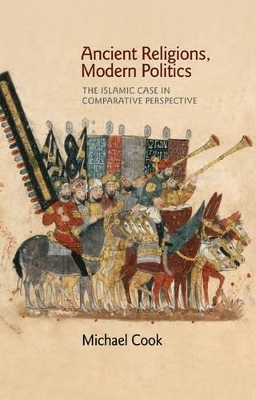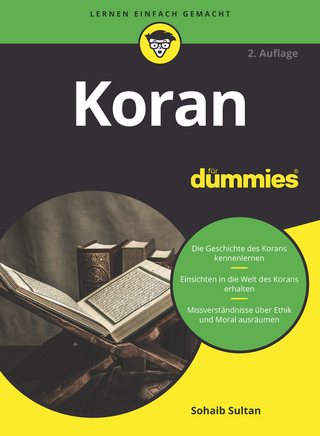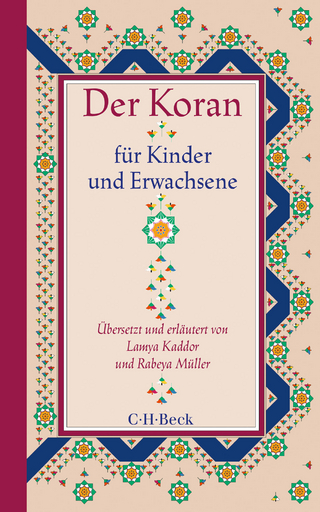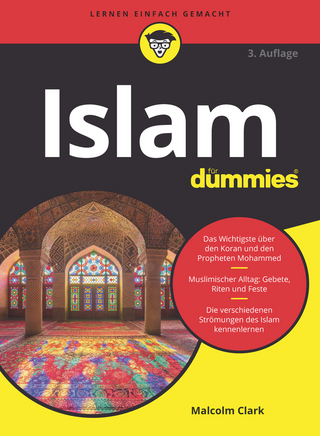
Ancient Religions, Modern Politics
Princeton University Press (Verlag)
978-0-691-17334-4 (ISBN)
The book also shows that fundamentalism--in the sense of a determination to return to the original sources of the religion--is politically more adaptive for Muslims than it is for Hindus or Christians. A sweeping comparative analysis by one of the world's leading scholars of premodern Islam, Ancient Religions, Modern Politics sheds important light on the relationship between the foundational texts of these three great religious traditions and the politics of their followers today.
Michael Cook is professor of Near Eastern studies at Princeton University. He is the author of Commanding Right and Forbidding Wrong in Islamic Thought and A Brief History of the Human Race, among other books.
Preface xi Part One: Identity Introduction to Part One 1 1 Islam and Identity 3 1. Introduction 3 2. Pre-modern ethnic identity: Turks and Trojans 3 3. Pre-modern ethnic identity: the Islamic factor 8 4. Eighteenth-century Identity politics 18 5. Pre-modern Muslim identity: formation and decay 20 6. The residue of Muslim identity on the eve of modern times 23 7. Modern ethnic and Muslim identity: expectations 32 8. Modern ethnic and Muslim identity: realizations 35 9. Muslim identity and geopolitics 47 10. Conclusion 51 2 Hinduism and identity 53 1. Introduction 53 2. The weakness of pre-modern ethnic and Hindu identity 54 3. Aspects of Hindu coherence 61 4. Modern ethnic and Hindu identity 71 5. Rallying Hindus against Muslims 91 6. What are the Hindu nationalists? 103 7. Conclusion 120 3 Catholicism and identity in Latin America 123 1. Introduction 123 2. The Virgin of Guadalupe 123 3. High expectations 126 4. Low realizations 134 5. Explaining the gap 140 6. Conclusion 154 Conclusion to Part One 156 Part Two: Values Introduction to Part Two 159 4 Society 165 1. Introduction 165 2. Islam 167 3. Hinduism 191 4. Latin American Catholicism 199 5. Religious elites 211 6. Conclusion 213 5 Warfare 215 1. Introduction 215 2. Islam 218 3. Hinduism 234 4. Latin American Catholicism 241 5. Conclusion 246 6 Divine jealousy 249 1. Introduction 249 2. Islam 251 3. Hinduism 282 4. Latin American Catholicism 297 5. Conclusion 307 7 Polity 309 1. Introduction 309 2. Islam 309 3. Hinduism 336 4. Latin American Catholicism 344 5. Conclusion 357 Conclusion to Part Two 361 Part Three: Fundamentalism Introduction to Part Three 371 8 Islam and fundamentalism 377 1. Introduction 377 2. Form 377 3. Substance: identity 386 4. Substance: values 389 5. Fundamentalism, conservatism, and modernism 393 6. Conclusion 397 9 Hinduism and fundamentalism 399 1. Introduction 399 2. Form 400 3. Substance: identity 409 4. Substance: values 411 5. Fundamentalism, conservatism, and modernism 414 6. Conclusion 429 10 Latin American Catholicism and fundamentalism 431 1. Introduction 431 2. Form 431 3. Substance 434 4. Fundamentalism, conservatism, and modernism 438 5. Conclusion 439 Conclusion to Part Three 440 Afterword 443 1. Looking back 443 2. Looking ahead 456 Appendix: "Hindu fundamentalism" and the Fundamentalism Project 463 Bibliography 469 Index 517
| Erscheinungsdatum | 09.12.2016 |
|---|---|
| Verlagsort | New Jersey |
| Sprache | englisch |
| Maße | 152 x 235 mm |
| Gewicht | 765 g |
| Themenwelt | Geisteswissenschaften ► Religion / Theologie ► Islam |
| ISBN-10 | 0-691-17334-6 / 0691173346 |
| ISBN-13 | 978-0-691-17334-4 / 9780691173344 |
| Zustand | Neuware |
| Haben Sie eine Frage zum Produkt? |
aus dem Bereich


